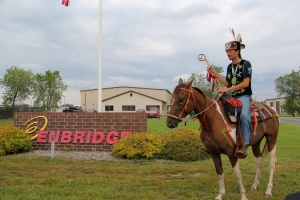
Michael Dahl (Ojibway from White Earth) outside of the Enbridge offices in Bemidji. Photo by Elizabeth Hoover
Enbridge Corporation wants to build a pipeline to carry fracked Bakken oil from the oil fields of North Dakota to one of its facilities in Superior, Wisconsin. About 302 miles of the proposed 616-mile pipeline would cut across northern Minnesota, traveling over lakes– rice beds and fish habitat. They want to utilize this particular route, even though others have been suggested, because it is the most direct route between the oil and their existing facilities. Some Minnesotans argue that transporting oil by pipeline is safer than by rail, that this project will create jobs, and that the state needs the property taxes that Enbridge would pay. Opponents, especially residents of northern Minnesota, argue that because the region is remote, when the pipeline leaks, hundreds of thousands of gallons of this volatile oil will leak out before anyone discovers it–like the Enbridge oil spill on the Kalamazoo River in 2010 that leaked 800,000 gallons of oil, continued for 17 hours, and still isn’t cleaned up.
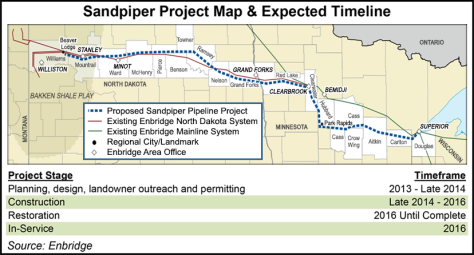
image courtesy of Enbridge
As I write this, members of Honor the Earth, Anishnaabe ricers, climate change activists and concerned MN residents, as well as pipeline supporters, are sitting in hearings at the Public Utilities Commission (PUC) in St Paul MN, where it will be decided if the PUC should issue a certificate of need for the pipeline to travel the preferred route set out by Enbridge, or if they should determine that reasonable alternatives exit. Winona LaDuke, executive director of Honor the Earth, has said time and again during different presentations, and reiterated in an interview we recorded along the ride: “my position has always been I’m not opposed to pipelines…I like infrastructure. I just don’t like this infrastructure. Because it turns out it doesn’t really benefit us, and it’s a lot of risk.”
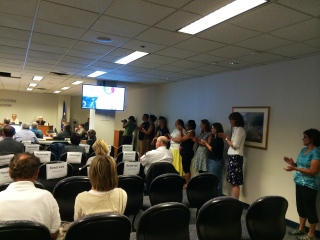
Inside the PUC hearing, where supporters stood out of respect for Michael Dahl’s testimony. On the screen you can see the berry pickers’ blueberries that Michael brought up with him to show the commission. Photo by Angelo Baca
We met up with Honor the Earth representatives Winona LaDuke and Michael Dahl at the Public Utilities Commission in St Paul back on August 7, when the commission was holding a hearing about the proposed route of the pipeline. Dawn Goodwin and a few other women from the Mawinzo Asiginigaazo berry pickers society came down from White Earth, and brought some of their berries with them. The literal translation of the name of their group is “berry pickers gathering up.” These women gather up not only berries, mushrooms, teas and other wild foods, but also gather up together to protect their harvesting sites.
Michael brought some of these berries with him to the front of the room while he implored the PUC to deny Enbridge’s preferred route, and to instead reroute their oil away from Anishnaabe traditional food sources. As he described,
“The proposed route runs directly through the historical manoomin harvesting route that has been followed for generations, running from Rice Lake in Aiken County, to Rice Lake in Clearwater County, the northwest corner of our reservation. Almost the entirety of this route runs directly through the 1855 treaty territories. This route and territories have been in our families’ lives for generations, dating back before any treaties or the state of Minnesota were even considered to be established. This proposed route would put in jeopardy major social, spiritual, economic icons to our people. Enbridge, a mere 60-year-old corporation worth billions of dollars, wishes to bring risk to the areas that are abundant with priceless sustainable resources to the indigenous people of this state and have grown to be loved and admired by all. And for us, the indigenous people, these natural resources have been a mainstay of our survival since the dawn of time.”

Big Rice Lake, which Winona LaDuke describes as “the mother lode of rice for our people.” Photo by Elizabeth Hoover
In her testimony to the PUC, Winona also highlighted the importance of the resources that currently exist along the proposed pipeline route: “One of the major sources of health for our people is to be able to continue to eat our rice. If we lose our rice, we will die. That is the reality of our situation. There are also many medicines that exist along the corridors that are proposed by Enbridge. Those medicines are things that we use and the biodiversity that exists in the north, within the preferred corridors of Enbridge corporation cannot be replaced once it is damage.”
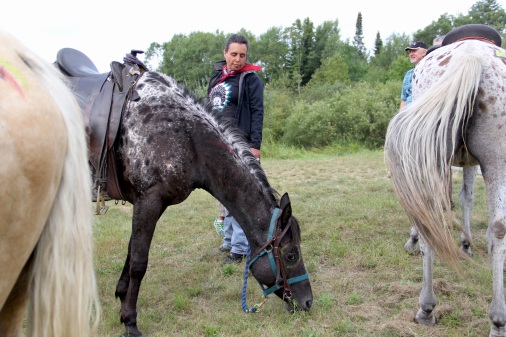
Winona LaDuke grazing her horse Luna during one of the breaks along the ride. Photo by Elizabeth Hoover
To bring attention to the regions that would be impacted by planned pipelines, Winona has been coordinating horseback rides along the routes the pipelines would take. When I asked Winona how she got started doing pipeline rides, she laughed, saying “I am Joy Harjo’s poem She Had Some Horses.” She descried how she had a dream that the pipelines were coming. In the dream she determined that they had to go against the current of the oil, so they rode horses against that current, and the power of the horse nation stopped those pipelines. She puzzled over that dream, bringing it to Lakota women like Deb White Plume, Faith Spotted Eagle and Rosalie Little Thunder, women who were also fighting the oil industry and who are avid riders. Then one day Winona woke up and realized that the dream was not intended for them, that it was her responsibility. She bought two horse trailers, bought some more horses, traded some horses, and “asked every Ojibway person I knew who had any idea about horses to join me.” She asked Michael Dahl, who provides spiritual guidance to her and many people in the community, as well as Amber Shaide and Lorna Hanes—all Ojibway horse people who had been having similar dreams, and who agreed to join her. In September 2013, they rode with supporters for 230 miles along the Alberta Clipper Pipeline, an 880,000 barrel per day pipeline of the Enbridge Corporation from Superior Wisconsin to the Red Lake Reservation. By that point, the Lakotas had decided that they would ride the proposed Keystone XL pipeline, and so the Ojibway riders went west to ride with them from Wanbli to Takini (or Bridger) on the Cheyenne River Reservation. When they returned, they rode the proposed Sandpiper Pipeline route—calling it the Triple Crown of pipeline rides. They repeated that ride this year, and I had the opportunity to join Honor the Earth from August 24-27th for the last 3 days of this 200 mile ride, joining a crew of about a dozen, riding 60 miles from Park Rapids to the community of Rice Lake, over Enbridge’s preferred route for the Sandpiper pipeline.
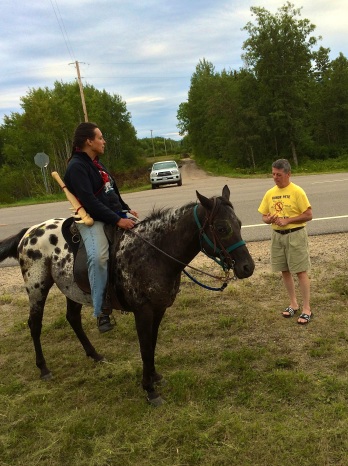
Winona LaDuke and Bill Kitchen, and anti-fracking proponent from upstate NY who drove 1500 miles out to Minnesota to meet the ride. Photo by Elizabeth Hoover
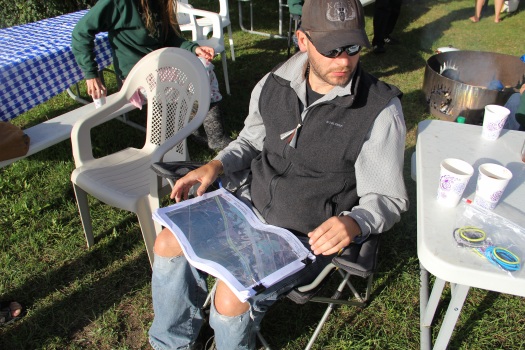
Shane Davis, who has been fighting fracking in Colorado, and joined Honor the Earth for the pipeline rides. As he described during the press conference outside the Enbridge office in Bemidji; “I came from Colorado where we have 54,000 active oil and gas wells. There’s 22,000 in the county I live in…In Colorado, 40% of operator spills have already resulted in groundwater contamination. And that is data from the Colorado Oil and Gas Conservation Commission. Every other industry in the United States would have been shut down because of that failure rate. It’s absolutely impossible for Enbridge, or any other operator, to have safe operations. Especially when they’re dealing with fracked oil that doesn’t have to abide by the Clean Water Act, the Safe Drinking Water Act, the Resource Conservation and Recovery Act, and a bunch of other federal regulations.” Here he’s studying maps of the landscape along the proposed Sandpiper pipeline route. Photo by Elizabeth Hoover
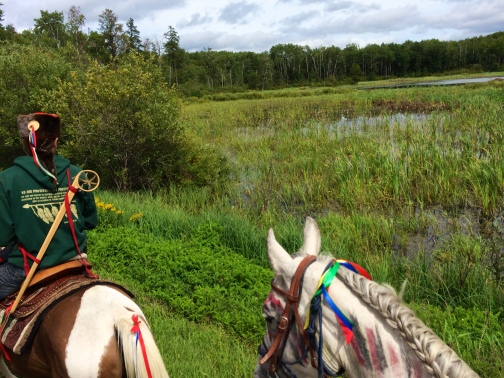
Riding past one of the many wetlands that could be potentially impacted by the Sandpiper pipeline. Photo by Elizabeth Hoover
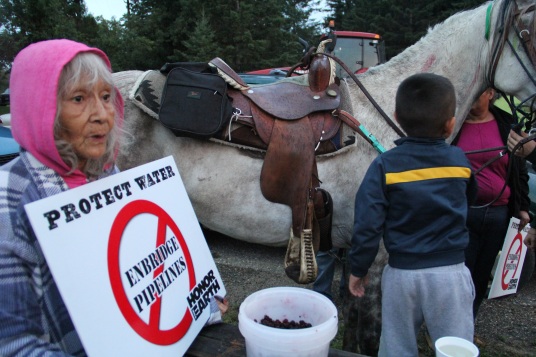
Joanne Gagnon-LaFriniere, one of the members of the Mawinzo Asiginigaazo berry pickers society. Photo by Elizabeth Hoover
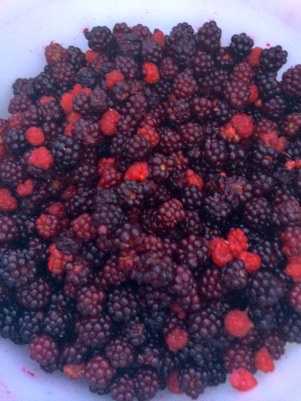
Raspberries and blackberries! Picked by the Mawinzo Asiginigaazo berry pickers society. They tasted amazing after a long day of riding! The berry pickers have one patch that produces seven different types of berries. They are concerned about how their right to gather on treaty lands could be impacted if that land is contaminated with oil. Photo by Elizabeth Hoover
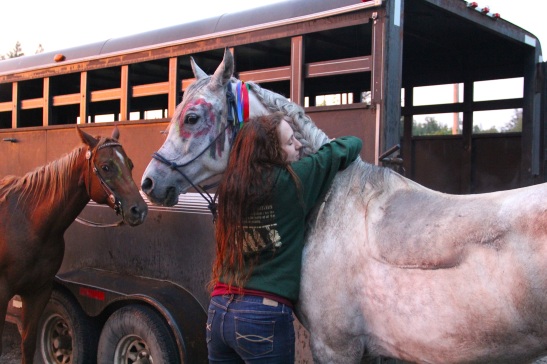
Molly Campbell, the Honor the Earth Campaign and Development Coordinator, giving Phantom a hug after a long ride. Photo by Elizabeth Hoover
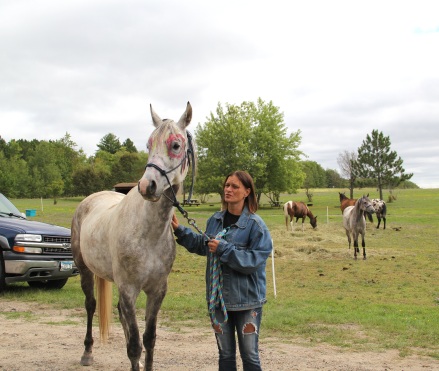
Amber Shaide (Ojibway) who owned many of the horses used on the trip and who spent hours trailering, grooming, and saddling horses. Photo by Elizabeth Hoover
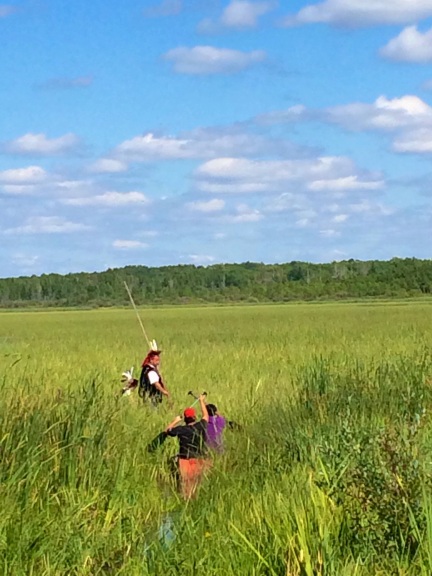
When the riders reached Big Rice Lake, some of the men went out in a canoe to pray over the rice. Photo by Elizabeth Hoover
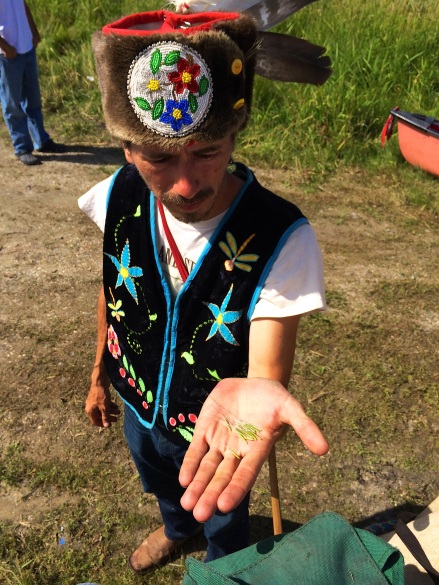
Michael Dahl holding wild rice that they picked while out on Big Rice Lake. Photo by Elizabeth Hoover
The ride culminated at the Rice Lake community center, where a powwow and potluck was organized to greet the riders. People made stews, cooked fish, and brought out their finest wild rice dishes, some even containing morels. Morels are wild mushrooms that can bring in big money for harvesters. When the weather has been just right, harvesters will go out pick as many as they can, keeping their harvesting sites a secret. The presence of this precious commodity in these wild rice dishes was further proof of how much this community valued this event. I wish I had taken more photos of the food: I was so exhausted from three straight days of riding that just getting into my powwow gear took all the energy I could muster.
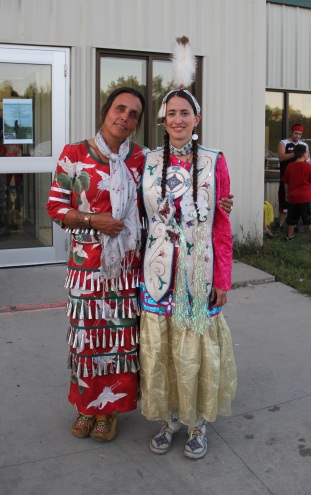
Winona and Liz at the powwow at the Rice Lake community center, , dancing on our tired legs after three straight days of riding
After 200 miles of riding over a three week span, after having his horse trip while running and literally roll over him and crush him, Michael should have been exhausted. But he stood up in front of the Rice Lake community full of energy and determination, and worked to convey to those present how important their presence was at future events and hearings around the pipeline. He likened the community rising up to what had happened to their wild rice this past season: “Our rice told us this would happen. This spring we got too much water. When the rice was supposed to stand up, it didn’t stand up because there was too much water. When we were supposed to stand up, we didn’t stand up. The rice finally got to stand up and it’s growing. We’ll still have rice. It’s not going to be great like we’re used to, but we’ll still have rice. So if we stand up now, next year our rice will stand tall, it will stand tall, and we won’t have to go somewhere else to get our rice. We have to stand up, we have to be visible.”
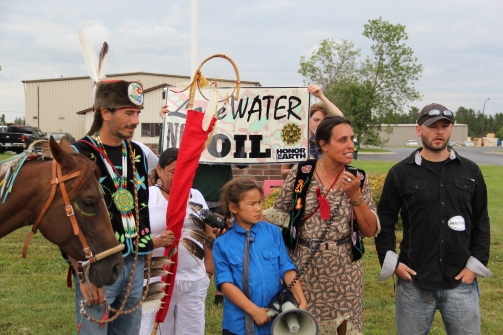
Michael Dahl, Winona LaDuke and Shane Davis at the Honor the Earth press conference outside of Enbridge’s Bemidji office. According to Winona, “we came here because in my experience, sometimes corporations make decisions and they don’t know the faces of the people that they will affect. And so I wanted Enbridge to see my face.” Photo by Elizabeth Hoover
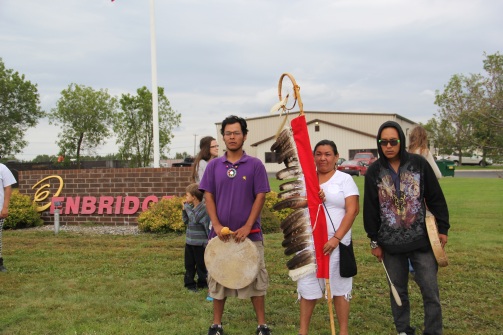
The Goodsky boys, Harvey and Algin, who sang through the entire trip. Pictured here at the Honor the Earth press conference at the Enbridge office in Bemidji. Photo by Elizabeth Hoover
The ride was an amazing experience. For many pipeline supporters living in the southern half of the state, the proposed Sandpiper pipeline route cuts across a nondescript, out-of-sight wilderness in the north. This is how the maps published by Enbridge depict this region–with neat, two-dimensional lines. From atop a horse moving across the landscape, I saw with my own eyes some of the wetlands that would be impacted if that pipeline were to leak. I saw the manoomin, the food that grows on water, that would no longer grow in these lakes when that pipeline leaked. As described in the wild rice post and the Bad River post, wild rice is very sensitive to contamination, and will die off if oil leaks into the water. What would they call Big Rice Lake if there’s no rice in it? While people can cite the need for tax money and construction jobs, and farmers complain that the rail system is too tied up carrying oil to carry their grain, what about the Anishnaabe people who have relied for centuries, and continue to rely, on these lakes for their food, and for their income? As Winona and Michael have both said during speeches, testimonies and press conferences, “if our rice dies, we as a people will die.” Honor the Earth and Anishnaabe people are fighting to make sure that doesn’t happen.
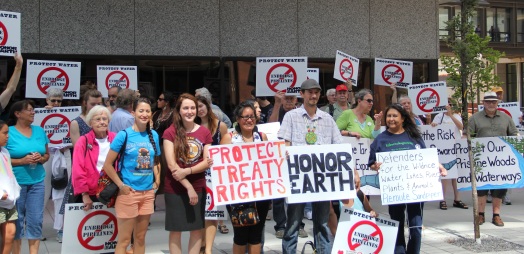
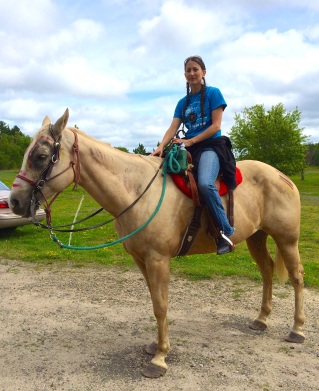
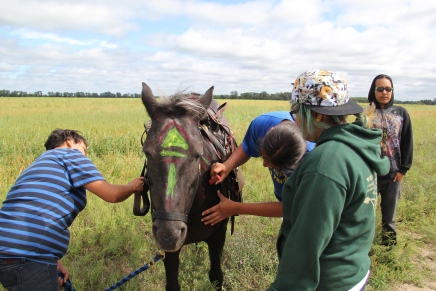
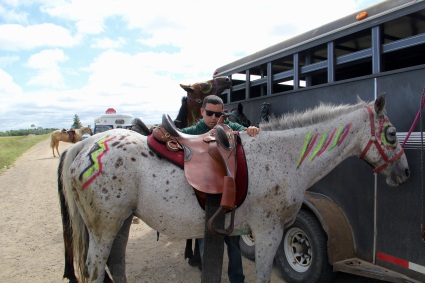
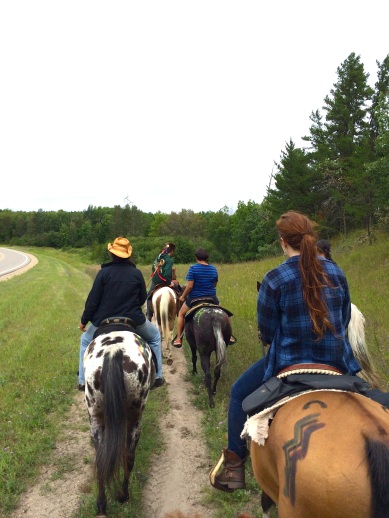
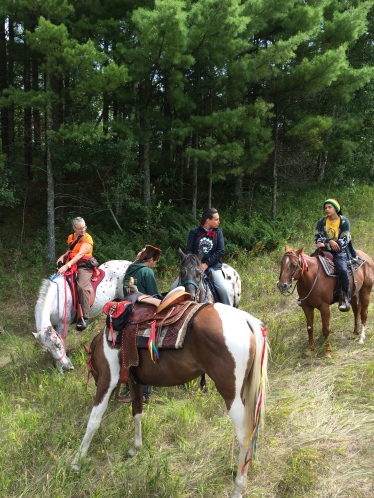
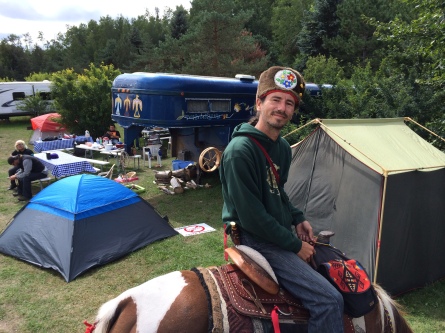
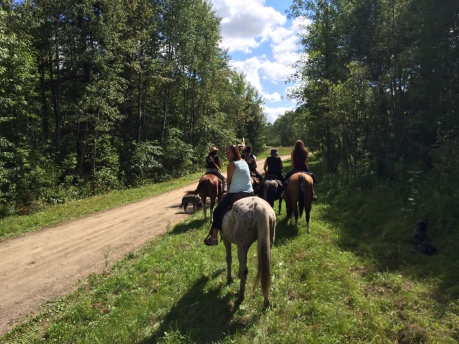
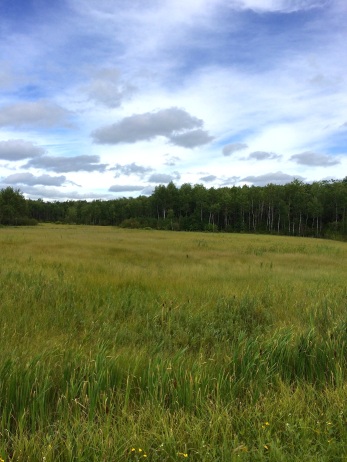
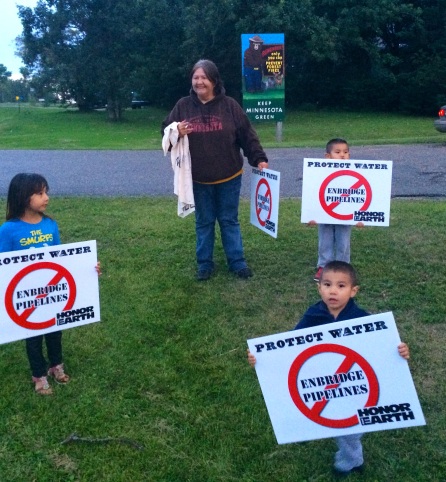
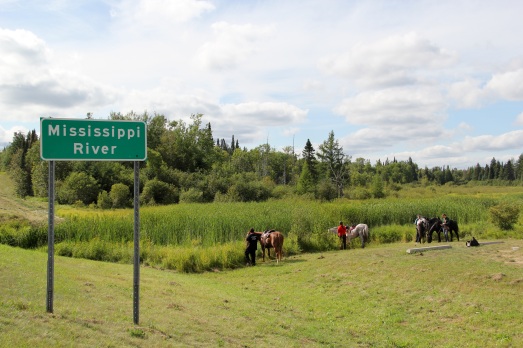
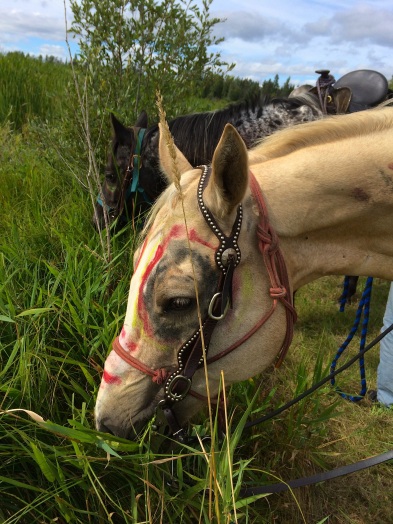
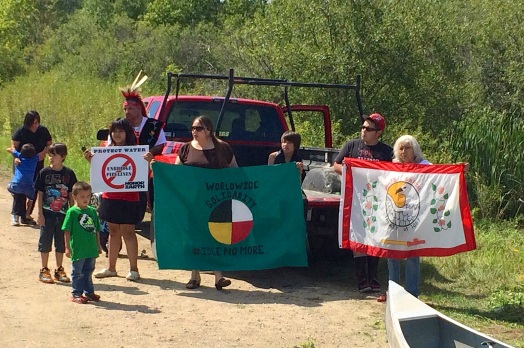
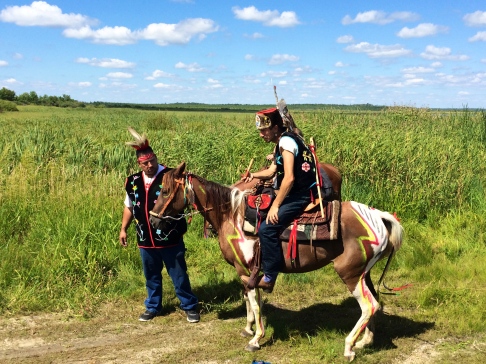
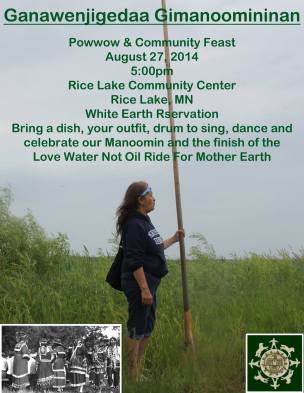
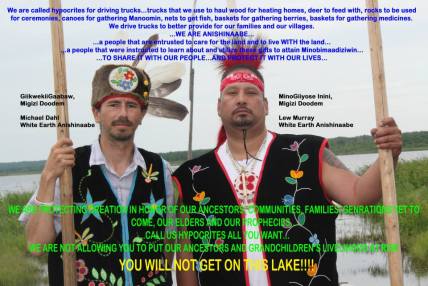



2 comments ›